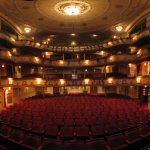September 12, 2019 – A vibrant cultural program will help crown Rijeka as the European Capital of Culture in 2020.
HRTurizam announced that the program would be presented to the media and the public in succession, during September and October, according to seven themes which bring in several individual programs and projects.
The events that will take place in Rijeka and the area of the Primorje-Gorski Kotar County, in 27 neighborhoods, were presented earlier this week, which have a particularly pronounced regional and European dimension.
By bringing together 27 neighborhoods across the Primorje-Gorski Kotar County and connecting them with neighborhoods from the 27 EU Member States, the inhabitants of the islands, coast, hinterland, highlands, city of Rijeka and Europe are brought together to cooperate and exchange experiences, customs, and everyday life. Connections and informal networks of cooperation are the keys to future cultural activities that will continue beyond 2020.
Emina Visnic, the director of Rijeka 2020, who was brought on to implement the European Capital of Culture project, emphasized that the project also brings high culture, big names, exhibitions, performances and concerts that represent a top cultural offer. However, the launch of the 2020 program deliberately started with this program direction, as it brings lasting value to Rijeka and Primorje-Gorski Kotar County – with motivated and active residents, aware that culture can be the driver of development of their small communities, which can make them recognizable on a larger scale.
“European cooperation and communication were launched with European neighbors, residents of Rijeka and the County to provide a European cultural passport. For to feel European or to feel belonging to Europe’s cultural and historical heritage is not a matter of administrative treaties and borders. On the contrary – this feeling rests on a deep understanding that we share with residents of other European countries and can share a number of common issues, challenges, problems, but also find ways to solve them,” explained Visnic.
https://www.youtube.com/watch?v=v=uI0jvD5h9ds
For example, Crikvenica’s program focuses on the old village at the top of the Kotor hill, which is one of the few localities without the construction of apartments. Fužine focuses on the topic of depopulation of Gorski Kotar, telling the story of school closures due to an insufficient number of students, while the Kastav neighborhood highlights the issues of endangered languages and minority language rights, since less than 1000 people speak the Kastav Chakavian language today. The Border District of the Drenova Neighborhood Program, as a Rijeka neighborhood, is driven by the idea of harnessing the potential in the settlement that can become a driver for the development of various amenities aimed at quality leisure time. Opatija, in its program, raises the question of an ecological future without waste in tourism.
The program’s name itself – 27 Neighborhoods – is symbolically related to the 27 EU countries that make up Croatia’s European neighborhood. The City of Rijeka’s European Capital of Culture program included officials and locals from 27 cities, municipalities and villages in the Primorje-Gorski Kotar County, and the Capital of Culture project linked them to as many local communities and organizations in the European Union.
The basis of the European Capital of Culture project is precisely to connect European citizens by presenting and learning about the cultural diversity of the countries that make up Europe’s total wealth, the organizers point out.
The programs bring a variety of cultural and artistic events, in which small communities can talk about their everyday life interestingly and attractively, as well as problems that are integral to the urban and rural areas of Gorski Kotar, the islands, coasts, cities, and villages.
You can find the full program and more details about the 27 Neighborhoods here.
To read more about travel in Croatia, follow TCN’s dedicated page.








